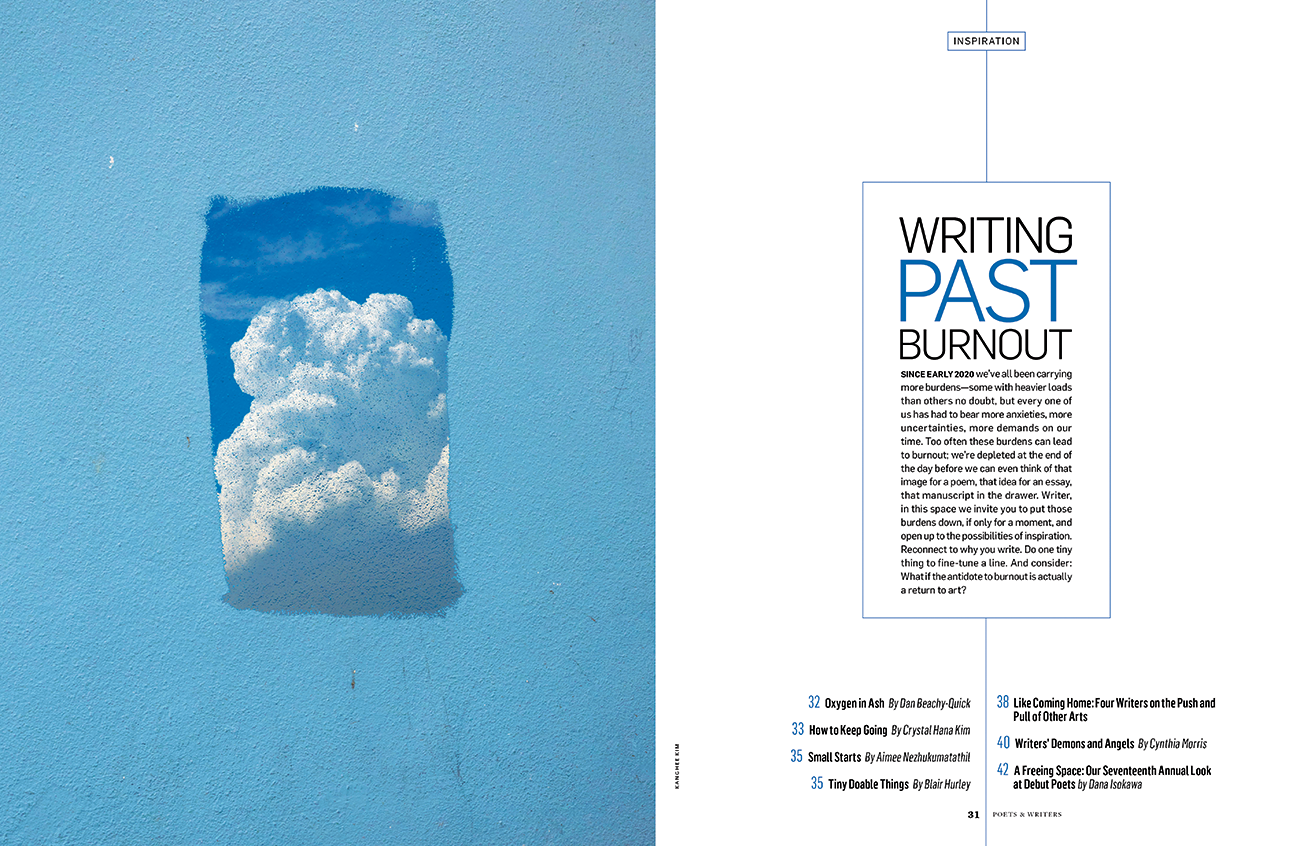Poets & Writers Magazine welcomes feedback from its readers. Please post a comment on select articles at pw.org, e-mail editor@pw.org, or write to Editor, Poets & Writers Magazine, 90 Broad Street, Suite 2100, New York, NY 10004. Letters accepted for publication may be edited for clarity and length.
Letters
Feedback from readers
As a connoisseur of sentences I want to commend Dan Beachy-Quick for having written, in his essay “Oxygen in Ash” in the special section Writing Past Burnout in your January/February 2022 issue, “[T]o breathe in during that summer was to inhale particulates potentially toxic, and to breathe out was to exhale a virus potentially fatal.” It’s a primo sentence, and he should feel justifiably proud for having uncorked it. The rest of the piece isn’t bad either.
Jon Krampner
Los Angeles, California
Just a note to say thank you for the Inspiration Issue (January/February 2022) as I, too, attempt to write past burnout—amazing timing! My first book is coming out in May, and I am struggling to keep plugging away on my second.
Sylvie Bigar
New York, New York
I enjoyed “Lucia Berlin: My Mentor in Being an Outsider” (November/December 2021). Jenny Shank paints a portrait of a generous writer who treats her students with respect and who values their contributions. I read some of Berlin’s stories years ago and knew at once that her mind could find connections in the world around us that many miss. She had an appreciation for the least of us and a wonderful sense of humor that made her fiction sparkle. Her ability to lift up the most vulnerable, as she did in her story “My Jockey,” makes her work unique. Thank you for sharing this perspective of her as a mentor and teacher.
Alice Landrum
Columbia, Missouri
“Dear Memory: On Creative Struggle, Stretching, and Asking for Help” (November/December 2021) by Victoria Chang came at a perfect time. I’ve been slogging away at the story of my dad’s life as a commercial fisherman for longer than I’d like to admit. Like Chang, who interviewed her mother, I interviewed my father, in our case seventeen years ago. Up until then we had exchanged letters through the years as we lived on different coasts, but in November 2004, we had many hours of long sit-downs. His razor-sharp memory, along with immediate access to the most arcane details about trawlers he’d fished on when he was twenty-one, stunned me. A local newspaper published the story at the end of that year. Dad died a month later. He was 89. I’m at it again, digging deeper for information on the different types of trawlers he fished on, from steam to diesel, from dragger to side to stern. Scrivener proves to be a useful organizational tool. The biggest obstacle I encounter now is my regret at not having pursued an MFA; at my weakest times I worry the book will not be good enough because I don’t have the craft needed. Chang writes, “No matter how hard I tried, I wasn’t going to be able to replicate the skill level of someone who had more natural talent or had gone to art school.” Bingo. Chang’s sharing about her success in publishing Dear Memory: Letters on Writing, Silence, and Grief by using the skill level she possessed and by calling on the help of friends is the best advice to keep this writer going, to let me be the writer I am rather the one I imagine I could have been, and to let this book be what it is, the story of a man’s life on the sea and how that life affected me.
Helen O'Neil
Charlestown, Massachusetts








